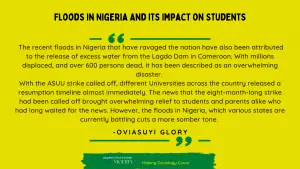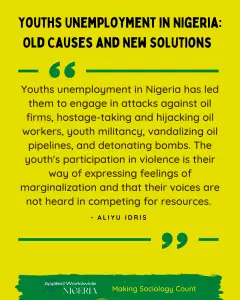If you are residing in certain parts of Nigeria, you are probably wondering why the month in January 2023 weather was hot instead of the usual dry, cold harmattan. You may have found it queer that you needed to have to cool off when March is still way ahead. The simple explanation for this abrupt change in weather is global warming in Nigeria.
Global warming according to Climate NASA is the long-term heating of the earth’s surface.

This heat is seen in the recorded temperatures of the ocean and land. The oceanic temperature has risen by 0.33 degrees celsius since 1969 at the top 100 feet of the ocean. The temperature of the earth’s surface has also increased by 1 degree celsius since the 19th century peaking around the last 40 years.
As a result of the heating of the earth, Ice sheets are shrinking, glaciers are retreating, snow cover is decreasing and the sea level has risen by 20cm in the last 100 years. Shockingly, this rate has doubled in the last 20 years.
The Intergovernmental Panel on Climate Change (IPCC) affirmed that human activities are the main causes of global warming. Human activity has contributed to the heating of the earth and the emission of greenhouse gases. Fossil fuel burning, and carbon emission are all examples of activities that increase the amount of carbon and trapped heat in the earth.
Here are a few things the warm weather of January was telling us
- The air may be warmer and more humid most part of the year.
In hot and humid climatic regions of Nigeria, the likelihood of more rainfall in the future is already evident. An increase in rainfall invites an increase in sea level which may result in devastating floods. Houses need to be structurally reinforced as a proactive measure against flood.
Communities, especially those that are unplanned need to pay closer attention to their drainage systems and ensure they are provided as well as unclogged in places where they exist.
The winds of harmattan have the notorious habit of carrying leaves and other wastes into drainage lines, creating a recipe for flooding when the rain comes.
The effects of the flooding last year in Nigeria left some bitter memories in our hearts. Entire villages and communities were displaced and swamped by it, especially those located along Rivers Benue and Niger.
The flooding of these important Rivers led to a regrettable blockade around the Lokoja bridge that connects the Northern and Southern parts of Nigeria. This led to the loss of many perishable food items from the north that was southbound and the delay in delivering fuel to the north from the south.
On the part of health effects of hot weather, the outbreak of measles during peak heat period is common, especially in overcrowded cities and towns. Health agencies especially at the state and local government levels must keep a close tab on crowded places for any signs of an outbreak and provide proper orientation on how to ensure cross ventilation.
- Power outages may be more rampant
It has become almost a tradition in Nigeria that the hot season is accompanied by prevalent power outages. Electricity Distribution companies hardly have enough power to distribute to their perennially disgruntled customers.
Power infrastructure such as transformers, feeder lines, and other installations frequently break down during periods of recorded high temperature.
Customers are often asked to wait for months before their transformers are repaired or raise the funds through community effort if they can not follow the hectic bureaucracy of the DISCOs.
This is a good time for those who can afford it to invest in alternative sources of power, especially the use of solar panels and inverters.
- Longer summer and shorter winter.
If the weather was already hot in January which is traditionally cold and regarded as a Winter month, it will mean we are about to experience short winters henceforth. And if Winters are short, Spring may not have the usual blooming time we are used to before the full-blown characteristics of Summer dawn on us.
Summers are periods of rain, greenery, and sunshine. The combination of these climatic factors is the biggest characteristic of the rainy season. Without the heat of sunshine, the rain does not fall and without rainfall, the lands, valleys, and hills will not be green.
When this balance is altered as we have already seen the highlights of, by January’s outing, we are guaranteed to be in for some surprises.
- Agricultural activities may change.
The average farmer in Nigeria spends his entire 12 months of the calendar planning around his farm and produce. From when the first rain falls to when the last crop of his farm finds its way to the silos or local market, he never stops planning.
The emergence of unusual heat in the month of January may send some signals to the farmer with a discerning mind. He may predict the early coming of rain and start clearing his farms earlier than the April-May routine. Harvests may arrive early if the tweak in the weather is maintained. Or harvest may be lost if the rainfall exceeds expectations and floods.
The wise farmer who farms around areas prone to flooding may consider planting crops that are resistant to overflooding or avoid planting very close to the river banks.
Crops that have a specific time of planting, such as sorghum which requires less rainfall may need to be carefully planned before planting. If the rainy season lasts longer than usual, such crops may have less time to fully grow and the investment can ultimately be lost.
Are We Enabling Global Warming in Nigeria?
The biggest enabler of climate change around the world is poverty. From the low-income earner who cares very little about its effect, to large multinational industries that operate at large scales to accumulate capital, the story is all centered around resource control or the lack of it.
With the sharp rise in the cost of cooking gas and kerosene in Nigeria, many households are using charcoal as a source of energy in their kitchens. These charcoal are derived from fallen trees in our forests, a practice that doesn’t bode well for our environment in the long run.
Long queues at our filling stations are common in many Nigerian cities despite the commodity selling at 350 Naira per liter. This underscores our strong dependence on carbon-emitting automobiles as the preferred mode of transportation. A situation that is not healthy for our dear earth.
Many Nigerian cities are competing to erect multi-level bridges and malls, fly-overs, and dualized traffic lanes as a sign of urbanity and progress. Many trees are in the process of these construction projects, with little shrubs and flowers planted as replacements. The tarred roads contribute a significant amount of the heat envelope experienced in our cities.
At home, many Nigerians that are not connected to prepaid meters have little to no awareness of what energy conservation means. It’s common to find households running electrical appliances even when they are not actively using them.
What Can We Do About Global Warming?
The first step toward tackling global warming is to acknowledge its existence and agree that our activities contribute to its spread. Strange as it may seem, there are still sections of the population who believe climate change is a hoax or political propaganda. Having such a mindset on an important issue such as global warming that has the tendency to alter our reality is an expensive gamble.
Investing in education and promoting access and equality among all genders and populations of the world is another good way to start. Without proper education, millions of people around the world will remain in poverty. And if there is anything we have learned so far, it’s that poverty is manure or catalyst to the proliferation of climate change.
Nigerians should do well and vote for leaders with not only the capacity to compete in building roads and bridges but those with ideas to think and develop policies that are sustainable. As it stands, with Nigeria only a few weeks to its general elections, global warming is the least problem on the lips of voters and politicians alike. This can and should change.
Nigerian governors have a very important role to play as the middlemen of governance. The Nigerian Constitution has already vested much power and responsibility upon them by making them the custodian of our lands, on which activities that are detrimental to the environment occur. They should rise above celebrating the payment of salaries to actually being agents of innovation and creativity in governance.
Nigerians should make conscious efforts towards running a lifestyle that is green and Earth-friendly. We can do without our overzealous thrift of owning private vehicles and give public transport a chance.
Farmers should desist from the easy practice of burning their farm fields in preparation for the new planting season. Such fires are not only potentially harmful but detrimental to the environment.
Not only do drainage lines in our cities and towns need to be unclogged but rivers need dredging too to improve their capacity to withstand increased rainfall. This will aid in averting the risk of flooding.
Conclusion
Global warming is real. It is currently in court in the capacity of its own attorney, profusely proving its existence. We can choose to acknowledge or ignore it. Needless to say, if you find yourself a part of its jury, you should probably listen.






